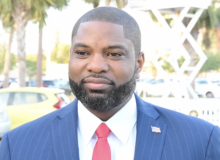Leaders need to lead and not follow the latest populist crusade or Twitter trend.
This is because, as election results again showed last fall, sensible voters outnumber the fringes, especially about current national security politics. Mock as you will, but America’s global engagement still maintains order, keeps us safe, and offers the best hope for the world.
In addition to performative politicians and cable news hosts, well-funded advocates will undoubtedly continue to cheer such misguided budget cuts without a modicum of strategic thinking. They’re part of a small cabal hoping to revive the same dangerous isolationism that led to global wars and 9/11-style attacks and weakened the United States.
In reality, when it comes to keeping us secure, most Americans support an ongoing engagement, as demonstrated by the vast majority who support our noble efforts with Israel, Ukraine, Taiwan, and other countries defending themselves from neighboring totalitarian aggression.
Despite what’s espoused on Tucker Carlson or Joy Reid’s island of populist lunacy, polls show Americans are not isolationist, and there is no overwhelming demand for restraint.
“I looked at the pictures of Mr. Putin trying to look for a trace of humanity.” Two decades ago @MrsMThatcher said THE brutal truth about Putin but the West was immensely naive. Very wise words ⬇️
pic.twitter.com/2m4H476lFq— Ivana Stradner 🇺🇸🇺🇦 (@ivanastradner) January 8, 2023
The 2022 midterm elections demonstrated that foreign policy extremism is unpopular. Common sense actions overseas have fairly broad support with the American public, despite unsavory efforts by some to use life-and-death matters as wedge issues.
So, while the Biden administration dropped the ball big time in Afghanistan and could be more decisive in Israel and Latin America, they should seek a new “internationalist caucus” to build on some ongoing foreign policy endeavors.
Sensible voices supporting patriotic internationalism outnumber smaller camps lobbying for isolationism, but much work is needed.
As last week demonstrated, attention-seeking political elements, aided by media allies, punch far above their weight by using various tools to deter progress.
A new internationalist caucus must remind everyone that 2022 was when the world wobbled but didn’t fall to evil.
c
Ari Kaufman is a correspondent for several U.S. newspapers and magazines from Minnesota and Ohio to Tennessee and Virginia. He taught school and served as a military historian before beginning his journalism career. The author of three books, he is also a frequent guest on radio programs and contributes to Israel National News and here at The Lid.
c
c
c






